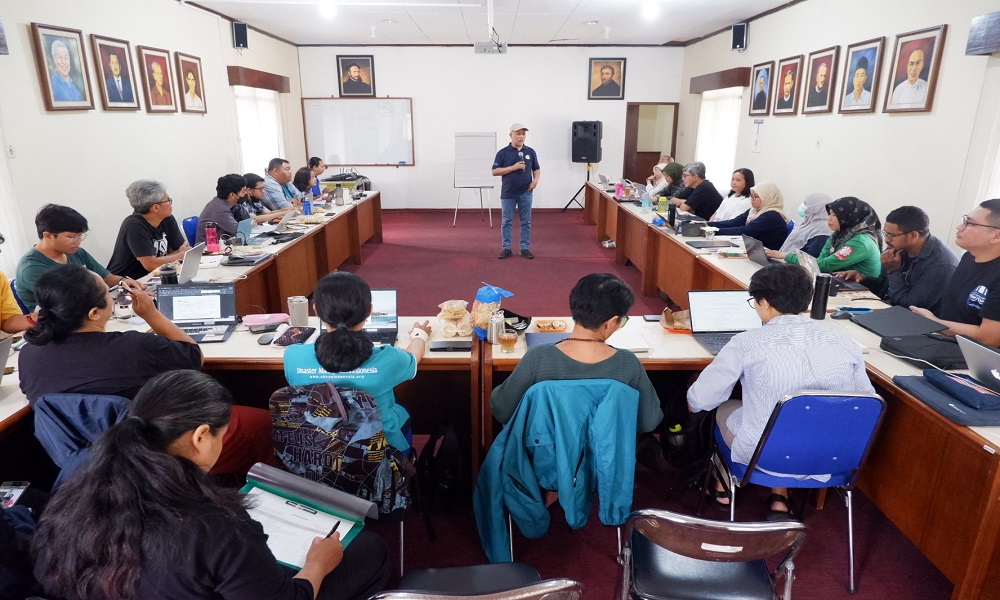 Yogyakarta, January 13–17, 2025 – Yayasan SHEEP Indonesia (YSI) conducted its 2024 Staff Meeting at the Mahoni Room, PT Kanisius, Yogyakarta. The meeting served as a platform to implement the Planning, Implementation, Monitoring, Evaluation, and Learning (PIMEP) cycle. This process was carried out participatively, involving all levels of the organization, from project to institutional levels. The meeting concluded with the presentation of the 2024 Semester II program achievements, followed by program planning for 2025. Over four days, all YSI staff members, including those from commissions, bureaus, and project management, actively participated in discussions and strategic decision-making.
Yogyakarta, January 13–17, 2025 – Yayasan SHEEP Indonesia (YSI) conducted its 2024 Staff Meeting at the Mahoni Room, PT Kanisius, Yogyakarta. The meeting served as a platform to implement the Planning, Implementation, Monitoring, Evaluation, and Learning (PIMEP) cycle. This process was carried out participatively, involving all levels of the organization, from project to institutional levels. The meeting concluded with the presentation of the 2024 Semester II program achievements, followed by program planning for 2025. Over four days, all YSI staff members, including those from commissions, bureaus, and project management, actively participated in discussions and strategic decision-making.
In addition to the PIMEP cycle, YSI emphasized that this staff meeting also served as a capacity-building platform by enriching references and insights. This approach ensures that every activity undertaken remains relevant to the evolving internal and external dynamics and challenges, rather than becoming mere routines. Thus, discussions during the meeting encompassed evaluations, accountability for achievements, and integrated planning aligned with these contexts and challenges.
On January 15, 2025, YSI’s Director, Andreas Subiyono, led a discussion on technological issues such as algorithms, artificial intelligence (AI), and the metaverse. This discussion highlighted the importance of understanding the societal and organizational impacts of technology, as well as the urgency of collaboration to address changes in the digital era.
For YSI, adapting to digital challenges and opportunities is imperative. Work methods, empowerment strategies, and community strengthening must align with technological advancements. However, YSI’s primary focus remains ensuring that digital technology contributes positively, creatively, and relevantly. To this end, critical discussions and analyses of technology are continuously pursued.
The sharing sessions during the meeting included presentations on achievements and plans by each commission and bureau. Key topics discussed included:
• Increasing disaster mitigation awareness and capacity through training and community strengthening.
• Enhancing partner capacity through thematic facilitation and network building.
• Issuing village regulations to protect local food resources.
• Revitalizing Family Posyandu as an integrated health service center.
• Optimizing social media and data management systems to improve the effectiveness of information dissemination.
The meeting also addressed 2025 program priorities, including the sustainability of strategic programs and the preparation of operational work guidelines (POK) based on the evaluation of previous activities.

As a follow-up, a workshop on POK preparation was conducted on January 17, 2025, aimed at providing comprehensive understanding of guidelines tailored to the organization's needs. The workshop focused on ensuring program alignment with the organization’s vision, enhancing program implementation efficiency and effectiveness, and optimizing inter-departmental collaboration through systematic and targeted work references. These guidelines are expected to facilitate coordination, support synergy among commissions and bureaus, and better document work processes.
The implementation of programs naturally involves internal and external challenges. Discussions included topics such as internal resource management and external factors like the Ministry of Villages Regulation No. 2 of 2024, which mandates village budget allocations for climate change adaptation, and the discourse on forest clearing for food self-sufficiency, which impacts the environment. YSI formulated several strategic recommendations to address these challenges in 2025, including:
• Strengthening cross-commission collaboration to achieve organizational goals holistically.
• Accelerating cloud-based data management and technology-driven initiatives.
• Enhancing the capacity of staff and volunteers to support inclusive program implementation.
• Integrating climate change education into the curriculum of partner schools as part of the child rights-based climate justice project.

The staff meeting concluded with a message emphasizing the importance of internal and external collaboration to ensure program sustainability and uphold the organization’s humanitarian values amidst local and global challenges. Organizational transformation remains a priority to address evolving dynamics and preserve YSI’s foundational values.

